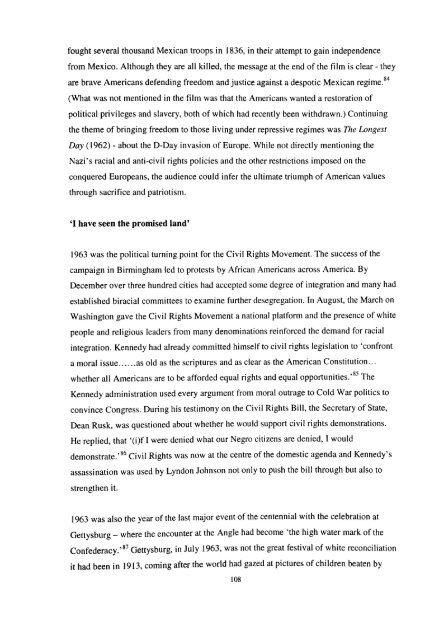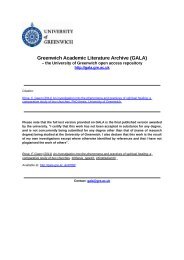Download (3483kB) - Greenwich Academic Literature Archive ...
Download (3483kB) - Greenwich Academic Literature Archive ...
Download (3483kB) - Greenwich Academic Literature Archive ...
- No tags were found...
Create successful ePaper yourself
Turn your PDF publications into a flip-book with our unique Google optimized e-Paper software.
fought several thousand Mexican troops in 1836, in their attempt to gain independencefrom Mexico. Although they are all killed, the message at the end of the film is clear - theyare brave Americans defending freedom and justice against a despotic Mexican regime. 84(What was not mentioned in the film was that the Americans wanted a restoration ofpolitical privileges and slavery, both of which had recently been withdrawn.) Continuingthe theme of bringing freedom to those living under repressive regimes was The LongestDay (1962) - about the D-Day invasion of Europe. While not directly mentioning theNazi's racial and anti-civil rights policies and the other restrictions imposed on theconquered Europeans, the audience could infer the ultimate triumph of American valuesthrough sacrifice and patriotism.1963 was the political turning point for the Civil Rights Movement. The success of thecampaign in Birmingham led to protests by African Americans across America. ByDecember over three hundred cities had accepted some degree of integration and many hadestablished biracial committees to examine further desegregation. In August, the March onWashington gave the Civil Rights Movement a national platform and the presence of whitepeople and religious leaders from many denominations reinforced the demand for racialintegration. Kennedy had already committed himself to civil rights legislation to 'confronta moral issue......as old as the scriptures and as clear as the American Constitution...whether all Americans are to be afforded equal rights and equal opportunities.' 85 TheKennedy administration used every argument from moral outrage to Cold War politics toconvince Congress. During his testimony on the Civil Rights Bill, the Secretary of State,Dean Rusk, was questioned about whether he would support civil rights demonstrations.He replied, that '(i)f I were denied what our Negro citizens are denied, I woulddemonstrate.' 86 Civil Rights was now at the centre of the domestic agenda and Kennedy'sassassination was used by Lyndon Johnson not only to push the bill through but also tostrengthen it.1963 was also the year of the last major event of the centennial with the celebration atGettysburg - where the encounter at the Angle had become 'the high water mark of theConfederacy.' 87 Gettysburg, in July 1963, was not the great festival of white reconciliationit had been in 1913, coming after the world had gazed at pictures of children beaten by108
















